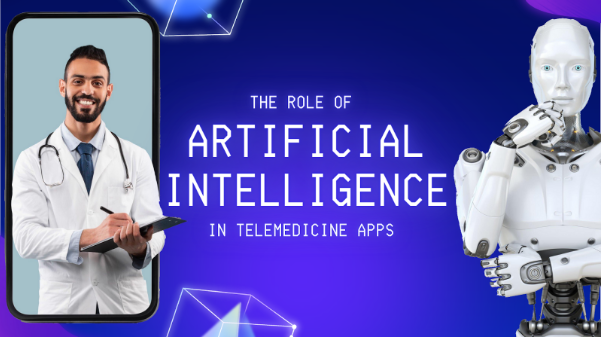The Role of Artificial Intelligence in Telemedicine Apps

Introduction
In the rapidly evolving landscape of modern healthcare, the emergence of telemedicine apps has revolutionized the way individuals access medical care. These digital platforms bridge geographical barriers, offering unprecedented convenience and accessibility to healthcare services. However, at the heart of this technological transformation lies the pivotal role of Artificial Intelligence (AI) in reshaping the functionalities and capabilities of telemedicine apps.
As the demand for remote healthcare services continues to soar, telemedicine app development companies are harnessing the power of AI to redefine the scope and efficacy of these digital health solutions. AI-driven innovations within telemedicine apps are not merely incremental; they represent a paradigm shift in healthcare delivery, optimizing patient care, diagnosis, and treatment modalities.
In this article, we delve into the intricate synergy between AI and telemedicine apps. We uncover how telemedicine app development company leverage AI’s capabilities to enhance user experience, streamline medical consultations, and revolutionize healthcare outcomes. Join us on this insightful journey as we explore the transformative impact of AI in shaping the future of telemedicine.
Understanding Telemedicine Apps
Telemedicine apps bridge the gap between healthcare and technology, enabling easy access to medical services irrespective of location. They serve as digital platforms for remote consultations, diagnosis, and treatment, evolving from basic video conferencing tools to sophisticated applications with real-time consultations and secure messaging.
These apps transcend physical barriers, offering medical services from routine check-ups to urgent care, providing convenience and accessibility to remote or underserved populations. Continual innovation by telemedicine app developers integrates advanced technologies like Artificial Intelligence (AI) and machine learning, enhancing features such as AI-driven symptom analysis, personalized recommendations, and predictive analytics, elevating user experience and healthcare outcomes.
In essence, telemedicine apps revolutionize healthcare delivery by empowering individuals to access quality medical care conveniently, regardless of their location.
The Integration of Artificial Intelligence
Artificial Intelligence (AI) stands as a cornerstone in revolutionizing the landscape of telemedicine apps, infusing these digital platforms with transformative capabilities. The seamless integration of AI technologies within telemedicine apps redefines the boundaries of medical accessibility and healthcare delivery.
One of the primary facets of AI integration in telemedicine apps is the development of sophisticated chatbot systems. These AI-powered chatbots act as virtual assistants, guiding users through preliminary assessments, scheduling appointments, and providing relevant information, offering users immediate access to healthcare guidance.
Beyond chatbots, AI facilitates intelligent symptom analysis, utilizing vast datasets and machine learning algorithms to assess reported symptoms. This feature empowers users by providing initial insights into potential health concerns, guiding them on whether immediate medical attention is necessary.
Predictive analytics, another AI-driven feature, plays a pivotal role in proactive healthcare. By analyzing patient data, AI algorithms can forecast potential health issues, enabling healthcare professionals to devise personalized preventive measures and treatment plans.
Moreover, AI-enabled telemedicine apps foster continuous learning and improvement. Machine learning algorithms, through continuous data analysis, adapt and enhance their diagnostic accuracy and treatment recommendations, refining their capabilities over time.
The integration of AI into telemedicine apps not only augments the efficiency of healthcare delivery but also nurtures a patient-centric approach. Users experience personalized care and timely interventions, all within the convenience of their chosen telemedicine app.
Benefits and Impact of AI in Telemedicine
AI-Driven Chatbots: Streamlining Patient Triage
AI-powered chatbots serve as the first line of interaction within telemedicine apps, efficiently triaging patients based on reported symptoms. These intelligent chatbots offer initial guidance, directing users to appropriate medical resources or professional assistance, streamlining the initial assessment process and ensuring prompt attention to critical cases.
Virtual Assistants: Optimizing Administrative Tasks
Virtual assistants, empowered by AI, handle administrative tasks seamlessly within telemedicine apps. From scheduling appointments to sending reminders and organizing medical records, these assistants optimize healthcare providers’ operational efficiency. Users benefit from smoother interactions and timely access to healthcare resources.
Personalized Healthcare Delivery: Tailored Recommendations and Predictive Insights
AI’s ability to process vast amounts of patient data enables personalized healthcare delivery. Algorithms analyze individual health data, offering tailored recommendations and predictive insights into potential health risks. This proactive approach allows early intervention, preventing complications, and improving patient outcomes.
Continuous Learning and Improvement: Evolving Diagnostic Accuracy
AI algorithms interact with users and process data continuously, evolving to enhance diagnostic accuracy and treatment recommendations over time. This continuous learning ensures that the algorithms adapt and improve, ultimately enhancing the quality of care provided through telemedicine apps.
The integration of AI amplifies the efficiency, accessibility, and personalized nature of telemedicine services, marking a significant leap in healthcare delivery.
Challenges and Future Prospects
While Artificial Intelligence (AI) integration in telemedicine presents groundbreaking advancements, several challenges warrant consideration for its seamless implementation.
Data Security and Privacy Concerns:
The reliance on vast amounts of sensitive patient data raises significant concerns regarding data security and privacy. Safeguarding this information against potential breaches and ensuring compliance with stringent data protection regulations remain paramount for telemedicine app developers.
Ethical and Regulatory Considerations:
Ethical dilemmas arise concerning AI’s decision-making capabilities within telemedicine. Ensuring that AI-driven algorithms prioritize patient well-being and adhere to ethical guidelines poses challenges. Regulatory frameworks need continual evolution to align with the rapidly advancing technology.
User Adoption and Accessibility:
While AI enhances telemedicine functionalities, ensuring universal access and user adoption among diverse populations pose challenges. Bridging the digital divide and ensuring equitable access to AI-driven telemedicine services is crucial for maximizing its benefits.
“Despite these challenges, the future of AI in telemedicine is promising, offering immense potential for innovation and improved healthcare delivery.”
Future Prospects:
The trajectory of AI in telemedicine foresees remarkable advancements. Continued research and development aim to address existing challenges, bolstering AI’s role in transforming healthcare.
Enhanced AI Capabilities:
Ongoing advancements in AI technology promise enhanced capabilities, including more accurate diagnostics, personalized treatment plans, and improved predictive analytics, further optimizing patient care.
Ethical AI Integration:
Future endeavors focus on developing ethical AI frameworks and regulatory standards to ensure responsible and unbiased AI integration, prioritizing patient welfare and ethical decision-making.
Universal Access:
Efforts to bridge the accessibility gap aim to ensure universal access to AI-driven telemedicine services, fostering inclusivity and equitable healthcare distribution.
In essence, while challenges persist, the future prospects of AI in telemedicine underscore a promising landscape of innovation and improved healthcare outcomes.
Conclusion
The fusion of Artificial Intelligence (AI) with telemedicine apps marks a turning point in healthcare accessibility. AI-driven innovations empower users with personalized care, revolutionizing medical interactions irrespective of geographical limitations.
Looking forward, the future of AI in telemedicine shines brightly with promises of enhanced capabilities and ethical integration. As we navigate these advancements, our commitment to fostering inclusive healthcare practices and ethical AI integration remains unwavering.
Join us in embracing the evolution of healthcare through AI-powered telemedicine. Explore the digital transformative potential of AI-driven telemedicine apps, ensuring a future where healthcare is not only advanced but also empathetic and universally accessible.
Read More: Jacuzzi Hot Tubs




